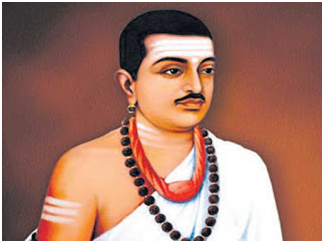Basava Jayanti: Birth Anniversary of Guru Basaveshwara | 15 May 2021
Why in News
The Prime Minister of India paid tribute to Jagadguru Basaveshwara on the occasion of Basava Jayanthi.
- In November 2015, the Prime Minister of India inaugurated the statue of Basaveshwara along the bank of the river Thames at Lambeth in London.
Key Points
- Birth
- He was born in Karnataka in 1131 CE.
- About:
- He was an Indian 12th-century Philosopher, Statesman and a social reformer.
- He was Lingayat saint in the Shiva-focussed Bhakti movement, and Hindu Shaivite social reformer during the reign of the Kalyani Chalukya/Kalachuri dynasty.
- The Lingayats are a Hindu sect with a wide following in southern India that worships Shiva as the only deity.
- He is also known as Bhakti Bhandari (literally, the treasurer of devotion), or Basaveswara (Lord Basava).
- Contribution:
- Basavanna spread social awareness through his poetry known as Vachanaas.
- Several important Lingayat works are credited to Basavanna, including Vachana such as the Shat-sthala-vachana, Kala-jnana-vachana, Mantra-gopya, Ghatna Chakra-vachana and Raja-yoga-vachana.
- Basavanna, like Gautama Buddha, taught people how to live happily in a rational social order which later came to be known as the Sharana movement.
- The Sharana movement attracted people from all castes, and like most strands of the Bhakti movement, produced a corpus of literature, the vachanas, that unveiled the spiritual universe of the Veerashaiva saints.
- Basava fought against the inhuman practice of the caste system, which discriminated against people based on their birth.
- The Anubhava Mantapa established by Basava laid down the foundation of social democracy.
- Basava believed that man becomes great not by his birth but by his conduct in the society.
- He taught the dignity of manual labour by insisting on work as worship.
- Death:
- He died in 1167 CE.
Bhakti movement
- The movement probably began in the Tamil region around the 6th and 7th century AD and achieved a great deal of popularity through the poems of the Alvars (devotees of Vishnu) and Nayanars (devotees of Shiva), the Vaishnavite and Shaivite poets.
- These saints looked upon religion not as a cold formal worship but as a loving bond based upon love between the worshipped and worshipper.
- Originally began in South India in the 9th century with Shankaracharya spread over all parts of India and by the 16th century was a great spiritual force to reckon with, especially after the great wave made by Kabir, Nanak and Shri Chaitanya.

